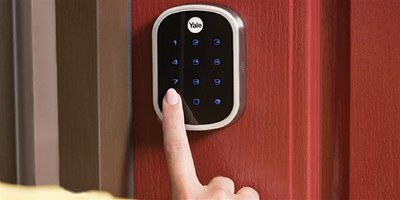Over the last couple decades, we’ve seen the use and availability of technological devices skyrocket. During this period, industries built on technology have seen products similar to what they provide hit mainstream markets. Of course, the security industry does not provide any exception to this phenomenon. This recent local story from 22News points out the newfound prevalence of security devices in the technology marketplace. As a local security company, we welcome this new focus on security-related products and services. In this post, we share some of our most valuable advice for security equipment shopping.
Since the term “security” casts such a large net, we’ll begin by explaining what types of products fit this description. This discussion may even peak your interest in products you have yet to consider purchasing. From there, we’ll discuss the potential for compatibility between DIY and professional security measures. Similarities in technology mean that if you plan carefully, you can purchase and install security equipment that works with your professionally-installed devices. We’ll also examine the importance of smart system design from a couple different lenses. For one, you’ll want to install your security devices in the most effective manner possible. Additionally, homeowners should make sure to only undertake legal security measures during their security equipment shopping. Let’s begin by focusing on what types of products we include when discussing “security equipment.”
What Fits Under the “Security Equipment” Umbrella?
As a local provider of all things security, we know well the scope of this term. Obviously, burglar detection equipment fits the description. Alarm systems, surveillance equipment, and standalone door/window contacts fit anyone’s definition of “security equipment.” Furthermore, we also include some devices that homeowners may not immediately think of as security-related. In particular, we include smart home devices such as automated lights, thermostats, and smart locks in this category as well. These appliances that add convenience for homeowners can also add security when used effectively. Let’s take a look at the many varieties of items homeowners look for while security equipment shopping.
Burglary, Safety, and Environmental Security Equipment
When people think of “home security,” they usually have a burglar alarm system in mind. While burglar alarms only make up a portion of what we install and service, they do make up a large portion. In fact, most of the appliances featured in the article that we opened this post with also fall under the “burglar detection” category. Devices meant to deter, scare, or detect thieves certainly fits the definition of security equipment. Just as importantly, we also include life safety products in this category. Smoke and carbon monoxide alarms make up a large part of this market. Panic buttons and medical pendants also fit this shoe.

Smart home locks, such as this model by Yale, create added convenience as well as security.
Finally, environmental sensors can add security to your home as well. Freeze and flood sensors and sensors meant to detect extreme temperatures all provide a valuable form of security. If you find yourself looking for any devices outlined here, consider yourself in the “security equipment” market. This section largely covers the basics of this very broad term. Now let’s look at one more popular arm of the security equipment market that deserves its own category.
Smart Home Devices
Recently, many security integrators have begun offering smart home services in addition to traditional burglar alarms. Our 7 Important Security System Additions for Your Smart Home discusses many of these specific devices and their security implications. Adding smart home lighting can make your home look occupied while empty. Installing smart thermostats can alert you to dangerously low or high temperatures. Many homeowners use smart locks to control and track access to their home. It’s no wonder, then, that we consider “smart home shopping” another branch of security equipment shopping. We always urge customers considering smart home products to take advantage of these smart security benefits. In fact, if you already have a security system, we may even be able to help you find smart home equipment that works with your existing alarm. Let’s take a closer look at how this concept works.
Ask Your Alarm Company About Compatibility with Existing Equipment
We often surprise customers in the market for smart home appliances by providing devices that work with their alarm systems. How does this work? Well, our cellular dialer, powered by Alarm.com, also doubles as a “Z-Wave” hub. This means that any appliance that utilizes the Z-Wave platform can work with your Alarm.com module. Cellular dialers provide the most consistent and reliable means of communication between an alarm and our central station. Therefore, we install these dialers in the majority of our security system installs.

Z-Wave is one of the most popular and highly-regarded smart home platforms on the market, making it easy for customers to find smart home devices that work with their existing security equipment.
If you already have an Alarm.com dialer, we can help ensure that you choose smart-home related security equipment that works with your alarm system. If you do nothave a cellular dialer yet, we can help get you on the right track. Many homeowners find the DIY smart home and security markets overwhelming and difficult to navigate. We can help ensure that you choose the best equipment on the market. Additionally, we can likely find equipment to work with security equipment you already have installed in your home. Now that we’ve looked at how to best go about security equipment shopping, let’s look at creating a design for this equipment that works for you.
Design Security Measures Carefully
Our Smart Security System Design and Smart Home Surveillance System Design posts examined the importance of thinking ahead during security equipment shopping and installation. Especially in the DIY market, many customers purchase devices before fully understanding how they work. This can lead to inefficient security. Buying devices that work on different smart home platforms, for example, can lead to frustration. More importantly, it can also lead to homeowners purchasing several smart home hubs. Planning efficiently can help create a more streamlined, less expensive, and more effective security plan. Furthermore, failing to plan security measures properly can even lead to legal issues. In this section, we’ll look at how to create a plan for buying and installing security technology that keeps you safe and secure, as efficiently as possible.
Creating the Most Effective Security Possible
While completing your security equipment shopping, make sure to compare the features between similar products closely. For example, you may know that you want to purchase surveillance equipment. You’ll want to buy cameras with the best video resolution possible. Cameras with inferior picture quality can fail to help you recognize criminals even if your cameras catch a thief in action. Furthermore, you’ll need to know if you can run wire to your camera locations. Buying hardwired cameras to cover locations where you should use wireless cameras will lead to frustration. Additionally, pay attention to how your cameras capture and store video. If you buy wifi-dependent cameras, gaps in internet service will lead to camera outages.

Homeowners often find the endless options and variables of security equipment shopping overwhelming.
If this sounds confusing, keep in mind that every category of home security requires this type of research and decision making. This includes burglar equipment, life safety devices, smart home appliances, environmental disaster detection, and more. Many customers find themselves overwhelmed with the variety of options available at every single level of security. Familiarize yourself with all of the variables for each type of equipment you wish to purchase. Failing to do so can lead to ineffective or even non-operational security measures. We receive many calls for customers seeking help after wading the waters of security equipment shopping. Calling a professional security company can help you make informed decisions during this process.
Ensuring a Legal Security Equipment Installation
Making poor choices during your security equipment shopping sessions can lead to even worse consequences than non-effective security. In some cases, installing the wrong equipment can even create an illegal security situation within your home. Our post on Avoiding Illegal Home Security Measures goes over many of these possible instances. Installing cameras that see (or hear) things that they shouldn’t can lead to legal action against you. Likewise, installing hidden cameras can lead to opening a can of worms from a legal perspective as well. Thinking of installing fake cameras, or cameras disguised as other devices? You may want to check with the authorities before finding yourself on thin legal ice.
Aside from surveillance equipment, other security measures can also land you in legal trouble. Our post on Residential Smoke Alarm Requirements in Massachusetts discusses some of the many requirements surrounding residential life safety equipment. Regulations abound regarding legal technology for smoke and carbon monoxide alarms. Just as importantly, homes must have smoke alarms installed in specific locations that vary based on the year the house was built. Of course, these are just a couple examples of the types of regulations security companies deal with every day. We recommend reaching out to a local security company such as ourselves if you question the legality of any security products you may wish to install.
Creating a Complete Security Equipment Shopping Plan
We hope that this post has given you some good tips to follow during your own security equipment shopping. If you have any questions about the material provided here, we encourage you to contact us. We provide free site surveys for home owners, and we can help make sure you purchase and install the best equipment for your home. As you know, the market for security equipment can prove overwhelming. We can help you navigate these waters and create an effective and efficient security plan. Additionally, we can help ensure that every measure of your plan also complies with all local legal guidelines. Together, we can create a security plan that takes advantage of the latest and greatest technology to keep you, your home, and your family as safe as possible.
Feature Photo Credit: Gotcredit on Flickr. Used under the CC BY 2.0 license.
